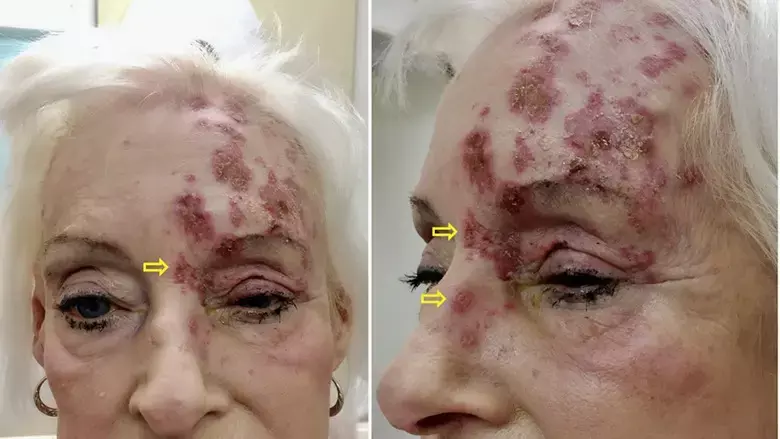- Home
- Medical news & Guidelines
- Anesthesiology
- Cardiology and CTVS
- Critical Care
- Dentistry
- Dermatology
- Diabetes and Endocrinology
- ENT
- Gastroenterology
- Medicine
- Nephrology
- Neurology
- Obstretics-Gynaecology
- Oncology
- Ophthalmology
- Orthopaedics
- Pediatrics-Neonatology
- Psychiatry
- Pulmonology
- Radiology
- Surgery
- Urology
- Laboratory Medicine
- Diet
- Nursing
- Paramedical
- Physiotherapy
- Health news
- Fact Check
- Bone Health Fact Check
- Brain Health Fact Check
- Cancer Related Fact Check
- Child Care Fact Check
- Dental and oral health fact check
- Diabetes and metabolic health fact check
- Diet and Nutrition Fact Check
- Eye and ENT Care Fact Check
- Fitness fact check
- Gut health fact check
- Heart health fact check
- Kidney health fact check
- Medical education fact check
- Men's health fact check
- Respiratory fact check
- Skin and hair care fact check
- Vaccine and Immunization fact check
- Women's health fact check
- AYUSH
- State News
- Andaman and Nicobar Islands
- Andhra Pradesh
- Arunachal Pradesh
- Assam
- Bihar
- Chandigarh
- Chattisgarh
- Dadra and Nagar Haveli
- Daman and Diu
- Delhi
- Goa
- Gujarat
- Haryana
- Himachal Pradesh
- Jammu & Kashmir
- Jharkhand
- Karnataka
- Kerala
- Ladakh
- Lakshadweep
- Madhya Pradesh
- Maharashtra
- Manipur
- Meghalaya
- Mizoram
- Nagaland
- Odisha
- Puducherry
- Punjab
- Rajasthan
- Sikkim
- Tamil Nadu
- Telangana
- Tripura
- Uttar Pradesh
- Uttrakhand
- West Bengal
- Medical Education
- Industry
10% of elderly patients of Shingles eyes lose vision, those having uveitis or immunocompromised

Herpes zoster (shingles) represents reactivation of latent herpes zoster virus in individuals with previous chickenpox infection. It occurs in one in three individuals over their lifetime, with significant sequelae, including recurrent episodes and post-herpetic neuralgia, and is associated with depression. In a recent study, researchers have found that among individuals with herpes zoster ophthalmicus, approximately 1 in 10 develop vision loss which was associated with older age, immunosuppression and uveitis. The study findings were published in the AMERICAN JOURNAL OF OPHTHALMOLOGY on February 11, 2021.
Herpes zoster affects 20% to 30% of the population at some point in their lifetime; approximately 10% to 20% of these individuals will have herpes zoster ophthalmicus (HZO). The incidence and severity of HZ increase with advancing age. Herpes zoster ophthalmicus occurs when HZ presents in the ophthalmic division of the fifth cranial nerve. Ocular involvement occurs in approximately 50% of HZ patients without the use of antiviral therapy. However, the rate of moderate and severe vision loss following HZO remains unclear. For the same purpose, researchers conducted a retrospective study, to assess the rate of moderate and severe vision loss following herpes zoster ophthalmicus (HZO) and to identify associated factors.
It was a retrospective cohort study of 869 subjects with HZO, who were evaluated at a single center from 2006 to 2016. The major outcome assessed was the proportion of individuals with moderate and/or severe loss of vision following an acute episode of HZO. Researchers also assessed the causes and factors associated with permanent loss of vision due to HZO.
Key findings of the study were:
• Researchers diagnosed ocular involvement of HZO at or within the first month of presentation in 737 individuals.
• They noted that the most common sites of ocular involvement were conjunctivitis (76.1%), followed by keratitis (51.2%) and uveitis (47.6%).
• They found moderate vision loss (≤20/50) secondary to HZO occurred in 83 eyes (9.6%) while severe vision loss (≤20/200) occurred in 31 eyes (3.6%).
• They also found the causes of loss of vision included corneal scarring (94.0%), corneal perforation (4.8%), and secondary glaucoma (1.2%).
• Upon multivariate analysis, they noted severe vision loss was associated with older age (HR 1.059), immunosuppression (HR 3.125), poor presenting visual acuity (HR 2.821) and uveitis (HR 4.777).
The authors concluded, "Among individuals with HZO, approximately 1 in 10 individuals may develop moderate or severe vision loss, primarily due to corneal scarring. Older age, immunosuppression, and uveitis are associated with severe permanent loss of vision secondary to HZO."
For further information:
Medical Dialogues Bureau consists of a team of passionate medical/scientific writers, led by doctors and healthcare researchers. Our team efforts to bring you updated and timely news about the important happenings of the medical and healthcare sector. Our editorial team can be reached at editorial@medicaldialogues.in.
Dr Kamal Kant Kohli-MBBS, DTCD- a chest specialist with more than 30 years of practice and a flair for writing clinical articles, Dr Kamal Kant Kohli joined Medical Dialogues as a Chief Editor of Medical News. Besides writing articles, as an editor, he proofreads and verifies all the medical content published on Medical Dialogues including those coming from journals, studies,medical conferences,guidelines etc. Email: drkohli@medicaldialogues.in. Contact no. 011-43720751


